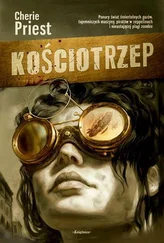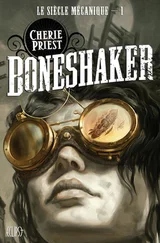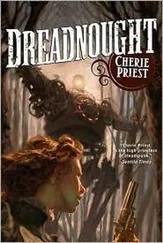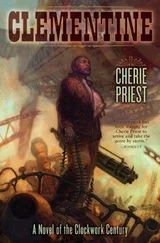She glanced out the window one last time. The image of Katharine Haymes wavered and wobbled as if it were surrounded by rainbows—distorted by the window itself. Ah, so that’s what the note had meant. The glass didn’t just protect observers, it detected the gas as well. The whole thing must be polarized, which must’ve cost a fortune.
But Katharine Haymes had a fortune.
Maria seized the research files and stashed them in her bag. She readied her gun, tested the mask one last time … and opened the control room door.
December 1880
“‘It did not happen immediately, but it happened quickly in the wake of Katharine Haymes’s death: Word was out. Word went even farther the next morning, when all of us—Abraham, Gideon, Nelson, and myself—exhausted to the bone yet thrilled to be alive, scattered to the four winds. We took the news wherever we went, threw it as far as our aim could reach.
“In the ensuing weeks, we found others reaching out from across the Mason-Dixon—reaching across a barrier that had once seemed insurmountable. The diminutive Confederate officer Sally Louisa Tompkins regained her standing and her credibility by force of will, and her voice amplified our message. Maria Boyd’s voice did likewise, for although she belongs to neither North nor South, she speaks to both with equal authority. So, too, Gideon Bardsley, no longer a slave but a citizen, both of Alabama and the District. Outcast and hero, the inventor and scientist who created the machine that might save us all with its warnings.’”
Julia shook her head. “Dearest, no one talks like that. Least of all you. ”
“No, but people write like this. This is the language that ‘keeps’ the best.”
“I wish you wouldn’t bother. Sounds a bit forced to me, if you don’t mind me saying so.”
“I don’t mind,” he said, not taking his eyes off the papers he’d so meticulously written out by hand. They’d taken five months to compose, and they went off to the printer tomorrow. This was his last chance to read it before he committed indefinitely to the saga. “But if I wrote it as it happened, with all the swearing and sweating, no one would want to read it.”
“Oh, but you’re wrong about that,” his wife murmured with a sly smile. She lounged in an overstuffed chair beside a cooling fire. “If anything, I think the readership might blossom. ”
“No one wants to read about men being bored on trains, or swearing every day when the post comes.”
“Or threatening to punch telegraph operators.”
“That only happened the once. You may rest assured, I’ve left that part out.”
She grinned, and she was beautiful. “More’s the pity. Honestly, I can’t believe you’ve written so much so quickly. Anyway, go on.”
“‘Those who had been silenced were heard, and although forces conspired to silence them once more, the truth grew larger than the lies—large enough to rise above them, and stand its ground. The undead leprosy was a threat to all. It cared nothing for the color of a man’s uniform, or the state of his purse. It disregarded politics, age, and virtue. It came for all alike.
“It came for us. ’”
“Oh, very dramatic, dear.”
“But it has come for us, hasn’t it? You’ve seen the measures we’ve taken—the measures we’ve been forced to take.” He meant the quarantined quarters. He meant the pits dug at the far side of town, and filled with the remnants of the writhing corpses, killed again and burned, then buried.
“The war is over, and that’s cause for celebration, isn’t it? We’re living at the beginning of a brave new age—a new era of cooperation against a common foe. But here you go, writing your memoirs like you’re already living the epilogue.”
“It is an epilogue of a sort,” he said defensively. “The end of the conflict—the reunification of the United States of America.”
“The ink on the treaty is scarcely dry, and here you go spilling more of it. You’ve earned some time to rest, and I wish you’d take it.”
He shook his head and bit his tongue, not saying aloud what he suspected at the bottom of his heart: He did not have as much time as she thought. Something was wrong; he felt it when he swallowed, when he woke in the night after nightmares of hands clenched around his throat. He sensed it in the weight he’d lost, and in the weakness he felt upon standing.
Julia would’ve called it old age, but it was something else, something he’d shared with no one but the physician Nelson Wellers—who now visited him weekly, for a chat and some brandy. And for an examination, after Julia went to bed.
Wellers saw it, too, and had offered prescriptions and suggestions, but not much in the way of diagnosis or hope.
Perhaps months, perhaps years. Perhaps it was nothing at all, for in some respects the human body was as foreign a frontier as the moon, or the bottom of the ocean. But in truth, Grant did not expect to find medical treatment. He only wished to tell someone in confidence that he knew he was dying, and to have that secret kept so long as it needed keeping.
He had withdrawn his bid for the presidency, and forfeited the November election, even though word in the papers and on the taps suggested he’d win in a landslide, after the tale of his exploits at the Lincoln compound became public news. He was a hero again, the upstanding general of legend rising one last time to prove his mettle against treason and treachery.
The public ate it up, and if anything, this feather in his cap did more to spread the Fiddlehead’s message than he cared to admit. He did not want their cheers, because he did not deserve them. He’d come around in the eleventh hour, in time to control the damage, but not prevent it. The fault was his. Not the credit.
If he hadn’t been the president, he might’ve even been able to take action sooner. His authority had never come from his figurehead position, but on the strength of his tactics and his “great brass balls” … as the air pirate—and now formally pardoned free man of color—Croggon Hainey had so eloquently put it.
Grant was glad the office was finally someone else’s problem. Now the freshly rebuilt United States rested in the hands of Rutherford B. Hayes, a lawyer from Ohio. A good man, by Grant’s estimation. Their disagreements were relatively few and minor. Grant had high hopes that the country’s restoration might be managed well and wisely now that the battlefields had fallen silent, the casualties were buried, and everyone lived under the same flag once again.
“Well,” Julia said, drowsy with the warmth and the lateness of the hour. “It’s a very exciting story, however you tell it. You’ve kept the ladies in it, haven’t you? I mean, I know you mentioned them in passing—but I hope you recounted their troubles. They were no less brave than you.”
“How could I tell the tale without them? They helped us save the Union, from opposite sides of the line.”
“And I hope you’ve left in the bit about the pirates.”
“The crew of the Free Crow, to be certain, and its captain—the last of the Macon Madmen. I left that part in, too, for the sake of spice. ”
“He must’ve been little more than a child when the jailbreak happened.” Then, as if it’d only just occurred to her, she blurted out, “And they were going to hang a child? How barbaric. ”
“Hang him, shoot him. The particulars are lost to time and memory,” he said vaguely, of the notorious incident of thirty-five years previous. Nine colored men convicted of arson and murder on spurious evidence and sentenced to die. In prison, they revolted, escaped, and scattered to the four corners of the earth. Only two were ever recaptured. Grant had drawn the story out of Hainey over whiskey one night; they had traded war tales and dirty jokes, and somber silences wherein their eyes did not meet.
Читать дальше










